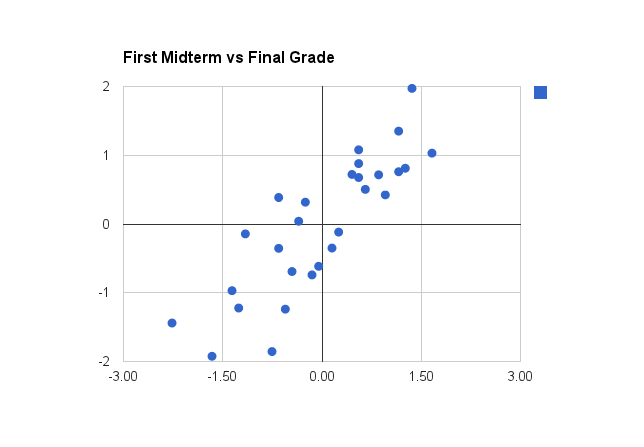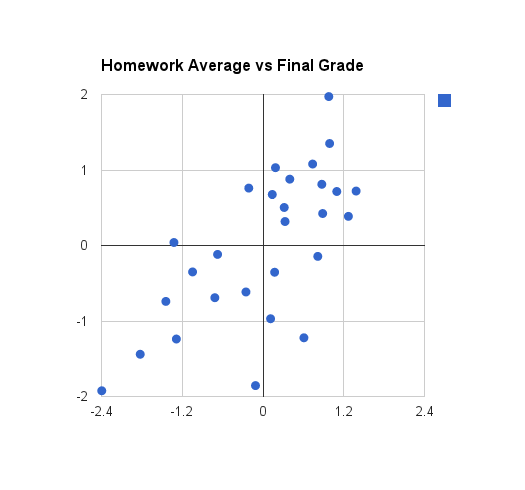All is said and done with Math 90 for 2012, and the year is coming to a close. I wanted to take this moment to write a few things about the course, what seemed to go well and what didn't, and certain trends in the course. that I think are interesting and illustrative.
First, we might just say some of the numbers. Math 90 is offered only as pass/fail, with the possibility of 'passing with distinction' if you did exceptionally well (I'll say what that meant here, though who knows what it means in general). We had four people fail, three people 'pass with distinction,' and everyone else got a passing mark. Everything else will be after the fold.
The most common question asked of me this semester was what grade would merit a passing mark for the class. I didn't know what to say, and so throughout the semester I gave the only information that I could guarantee: a 70 would pass. How accurate was I? Not so accurate, it turns out.
A hard 56% was the cutoff for a passing grade. The overall class mean was a 71, with a 70 median. Our class mean was a 71, with a 73 median. The standard deviation was almost a full 14 points, which is a little bit crazy. So this means that the cutoff for passing was approximately one standard deviation below the mean. In a world with a perfectly normal distribution, we would expect something like 84% of the class to pass from this statistic, and in fact 88% actually passed.
It seemed to me that the 'goal grade' of the class was a 70%, a byproduct of being only pass-fail. It's hard to say, but I think the quality of the course suffered a bit from it. But the purpose of making Math 90 pass-fail is to reduce the number of students repeating calculus in order to pad their grade. Which is more important? It's hard to say.

Interestingly, the first midterm was an incredibly accurate indicator of course performance. I've attached a picture at right indicating how unbelievably linear and strong the correlation between first midterm performance and final grade are.
We always tell students to really work on their homework, so I think it's natural to see how well one's homework grade served as a predictor of one's final grade. And the answer might surprise - good homework grades had a weak correlation with good final grade. But a bad homework grade had a pretty strong correlation with bad final grade. In other words, if you didn't do the homework well, you didn't do good in the class. But some people managed to complete the homework without mastering the material, so to speak.

That graphic is also included here, with homework on horizontal and final grade on vertical.
Passes with distinction were given to the students who got over 2 standard deviations above the average, more or less. Interestingly, two of the three 'distinguished' people were the two most frequent visitors to my office hours (the third never visited).
Recitation grade and recitation attendance had a very weak but positive correlation to final grade. I wish we had data on lecture attendance, as that would likely serve as a slightly stronger indicator than recitation attendance.
Leave a comment
Info on how to comment
To make a comment, please send an email using the button below. Your email address won't be shared (unless you include it in the body of your comment). If you don't want your real name to be used next to your comment, please specify the name you would like to use. If you want your name to link to a particular url, include that as well.
bold, italics, and plain text are allowed in
comments. A reasonable subset of markdown is supported, including lists,
links, and fenced code blocks. In addition, math can be formatted using
$(inline math)$ or $$(your display equation)$$.
Please use plaintext email when commenting. See Plaintext Email and Comments on this site for more. Note also that comments are expected to be open, considerate, and respectful.
Comments (2)
2013-01-21 philo
First midterm vs final grade... like whoa. Why bother even taking calc anymore if youo badly on the first test. wish I'd known that.
2013-01-22 davidlowryduda
That is one takeaway. Maybe the right way to look at it is that one should work very hard to not fall behind. Catching up is prohibitively difficult.